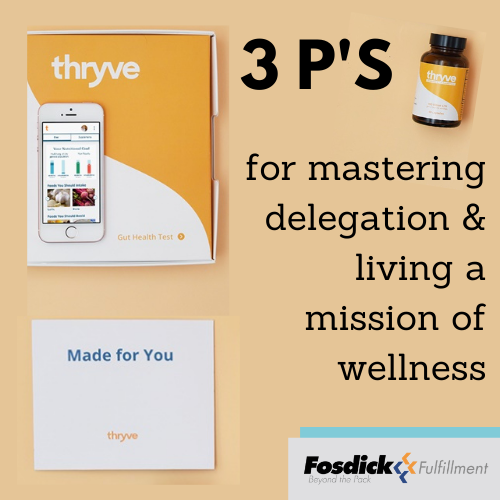Lots to unpack in this post from Thryve Inside CEO, Richard LIn. But primarily, the founder is reflecting on a series of conscious decisions enacted over this past year to not spread himself too thin and to delegate more. The impact of these efforts were felt immediately and to say the results have been favorable is a profound understatement. These days, the health and nutrition startup focused on gut health supplementation is truly living up to its namesake from a business perspective.
But the CEO is also thriving on a personal level, putting in just 15 hours a week, down from nearly eighty the year prior.
Lin attributes successful work/life balance at Thrive Inside to a three pronged approach to management – what he calls the three P’s of delegation:
- Process
- People
- Partners
And while Fosdick falls into the category of partner with respect to our Thrive Inside client relationship, it is hard to deny the vital nature of each and the many ways in which the P’s overlap.
For instance, our logistics partnership with Thrive Inside is also contingent on people – the men and women operating out of Fosdick and Thrive HQ’s respectively who collaborate in nurturing this particular business relationship.
Customer relations are fundamental to the work we do at Fosdick, perhaps even more so than the fifty plus years of 3PL expertise that have solidified our place as a leader in the industry. And at the heart of this customer driven mission is transparency. We pride ourselves on clear and timely interface with clients from initial contact, to onboarding, all the way through the point at which a start-up achieves eCommerce scalability.
This is in large part due to Fosdick’s culture of convivial, yet pointed communication. Clients are offered limitless access to Fosdick operators, and as such, are able to avoid the bottlenecking that results from online contact forms, email etiquette, and other formal processes for client requests for service, support, or general inquiry.
This is especially vital right now during peak season, when merchants and shippers must be in continuous contact. The holiday shopping and shipping season is littered with threats to timely deliver-by dates, delays in pick and pick services, and more.
On the seller’s end, peak order volume (sometimes up 100% from the normal rate) and massive return rates are also problematic.
Yes, this is the process side of our business – the systems and logistics specific to each client. But it has also been our experience that many issues associated with process, like those mentioned above, are solved, or better yet avoided completely, through clear and open communication.
All of this to say that start-ups would be wise to heed Richard’s advice to delegate wherever possible as soon as it seems viable to do so.
So much of success in this business is about longevity. Take from a 50-year vet: no matter how you cut it, the DIY approach to start-up retail is just not sustainable.
And in 2020, it also is not necessary. We touched on this a bit last month in a blog titled Third-Party Logistics and the Piecemeal Supply Chain: Helping Start-Up Brands Break Free of the Amazon Trap.
In the article, we talked about the strong hold Amazon has over young brands who lack the wisdom or human capacity necessary for bootstrapping their DTC supply chain. All the people Richard Lin is referring to in his post who become partners that help manage processes are part of an infrastructure we’ve come to refer to as the piecemeal strategy, what Amazon is able to offer in one fell swoop.
And yet, this approach is capable of saving companies from “coughing up the sizable percentage Amazon skims off the top of sales.”
What’s more, brands like Thryve who delegate across a network instead of direct to one juggernaut e-tailer “are able to avoid the sort of cannibalistic product replication that seems to have become inevitable of the merchant sellers agreement.”
That said, start-ups that want to avoid relying on Amazon as a sole sales channel cannot just go it alone. That’s where those 80 hour work weeks Lin mentioned kick in. Building your piecemeal supply chain means utilizing the 3 P’s of delegation. Richard Lin and Thrive is a case study in why it is so important to come out of the weeds once in a while where backend work doesn’t always seem additive to the bottom line. Just a bit of big picture reflection, though, and it will become abundantly clear: when it comes to building out a piecemeal supply chain that allows for delegation across business systems, the juice is definitely worth the squeeze.

